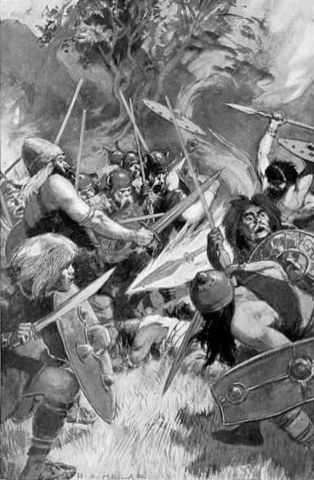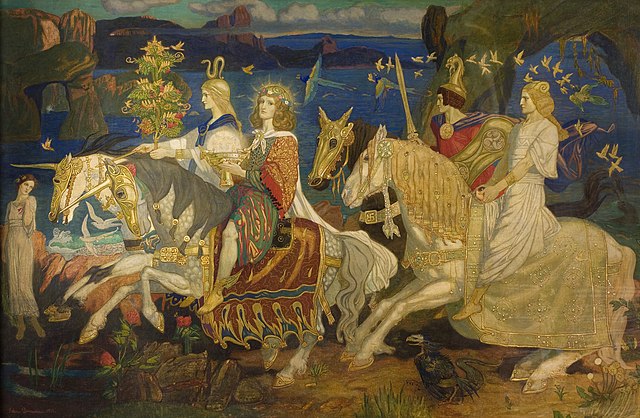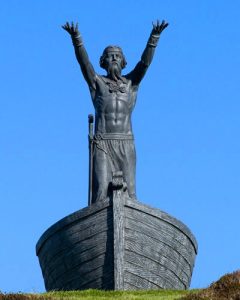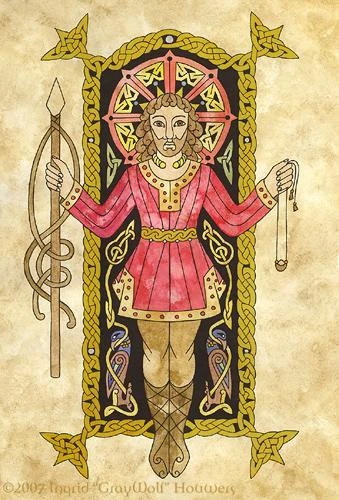Lugh the Ildánach: God of War, Craft, and Kingship
This blog series aims to keep our Irish heritage alive by sharing the rich stories of our myths and legends. These tales are a vital part of Irish culture, passed down through generations, connecting us to our history, values, and sense of identity. Retelling these stories continues the tradition, keeping our culture vibrant for future generations.
One of the most revered figures in Irish mythology is Lugh of the Longarm. Known as the god of many skills, Lugh is celebrated for his mastery of war, the arts, crafts, and leadership. His talents earned him the title “Lugh the Ildánach,” meaning “the many-skilled.”
Lugh’s legendary stories are filled with drama and heroism. Perhaps most famously, he played a vital role in the battle against the Fomorians, a mighty race that threatened the land of Ireland. In this blog post, we’ll explore Lugh’s incredible feats, his leadership in times of war, and the lasting impact he left on Irish myth.
Table of Contents
Who is Lugh of the Longarm?

Lugh of the Longarm is one of the most important gods in Irish mythology and a proud member of the Tuatha Dé Danann, the mystical race of gods and heroes. He is often called “Lugh the Ildánach,” which means “the Many-Skilled.” This title highlights his exceptional talents in various areas, from warfare and leadership to arts, crafts, and magic. Lugh wasn’t just good at one thing—he was a master of many.
Lugh’s family background is also significant. His father, Cian, was a member of the Tuatha Dé Danann. At the same time, his mother, Ethniu, was the daughter of Balor, leader of the Fomorians. This gave Lugh of the Longarm a unique connection to the Tuatha Dé Danann and the Fomorians, two opposing forces in Irish mythology. Despite his Fomorian heritage, Lugh sided with the Tuatha Dé Danann, leading them to victory against his grandfather Balor and the Fomorians in a legendary battle.
Lugh of the Longarm’s story is one of triumph, skill, and leadership, making him one of the most revered gods in Irish mythology.
The Master of Many Skills

Lugh of the Longarm is best known for his incredible range of talents, earning him the title “Lugh the Ildánach,” or “the Many-Skilled.” He wasn’t just a warrior but also a master of craftsmanship, magic, poetry, and strategy. In Irish mythology, Lugh stands out as a god who could do it all—and do it well.
One famous story tells of how Lugh came to the court of the Tuatha Dé Danann and asked to join them. The gatekeeper asked what skill he could offer, as they already had experts in every field. Lugh responded by listing all his talents—he was a warrior, a poet, a musician, a healer, a blacksmith, a magician, and more. The gatekeeper turned him away, saying they already had people for each role. But Lugh cleverly asked if they had anyone who could master all of these skills. Of course, they didn’t, so Lugh was welcomed into the Tuatha Dé Danann.
This story highlights Lugh’s significance as a leader. His many abilities made him a valuable member of the Tuatha Dé Danann and their greatest asset in times of war and peace. Lugh’s mastery over so many areas allowed him to lead with intelligence and strategy, making him one of the most revered gods in Irish mythology. His skills in warfare helped the Tuatha Dé Danann secure victory. At the same time, his talents in the arts and magic shaped the culture and creativity of their people.
Lugh’s Greatest Myth: The Battle with Balor

One of Lugh’s most famous and dramatic stories is how he defeated his grandfather, Balor, during the Second Battle of Mag Tuired. Balor was the fearsome king of the Fomorians, a race of giants and monsters constantly threatening the Tuatha Dé Danann. Balor was especially terrifying because of his deadly eye, which could kill anyone it gazed upon.
There was a prophecy that his grandson would one day kill Balor. To prevent this, Balor locked his daughter Ethniu away to keep her from having children. But fate had other plans. Ethniu had a son with Cian of the Tuatha Dé Danann; that child was Lugh.
When Lugh was born, Balor ordered that the child be killed by tossing him into the sea. Instead of drowning, Lugh was brought to Manannán mac Lir, God of the Sea.
Lugh was raised by Manannán mac Lir, the god of the sea and the Otherworld. Manannán became Lugh’s foster father and raised him on the Isle of Emain Ablach. Under Manannán’s care, Lugh learned many essential skills, including magic, combat, and leadership.
Manannán also gave Lugh several powerful gifts, including the sword Fragarach and the horse Aonbharr, preparing him for the significant role he would one day play in Irish mythology.
When the time came for the Tuatha Dé Danann to battle the Fomorians at Mag Tuired, Lugh led his people. During the battle, Lugh confronted his grandfather, Balor. As Balor prepared to use his deadly eye, Lugh struck first. Lugh hit Balor in the eye with a mighty spear, killing him and fulfilling the prophecy.
This myth is more than just a tale of family betrayal; it represents the triumph of the Tuatha Dé Danann over the chaotic and destructive forces of the Fomorians. Lugh’s victory over Balor symbolizes the balance of order and creativity (represented by the Tuatha Dé Danann), defeating the forces of destruction and oppression (represented by the Fomorians).
It also shows Lugh as a hero destined for greatness, proving his role as a leader who shaped Ireland’s future.
The Heroic Leadership of Lugh
Lugh’s leadership was crucial in the Tuatha Dé Danann’s fight against the Fomorians. When the time came for the Second Battle of Mag Tuired, the Tuatha Dé Danann needed a strong and skilled leader to guide them against the powerful Fomorians.
With his many talents and sharp mind, Lugh was the perfect choice. His combination of warfare, strategy, and leadership skills made him stand out, and he quickly became the one everyone looked to for guidance.
During the battle, Lugh’s strategic genius turned the tide. He didn’t just rely on brute force—he used clever tactics to outsmart the Fomorians, ensuring that his people were always one step ahead.
His understanding of war and magic gave the Tuatha Dé Danann a significant advantage. One key moment was when Lugh personally faced Balor, the leader of the Fomorians, and defeated him, shattering the Fomorians’ morale.
Lugh’s leadership didn’t end with the Fomorians’ defeat. After the battle, he restored balance and order to Ireland. With the Fomorians gone, Lugh helped guide the Tuatha Dé Danann into a period of peace and prosperity.
His wisdom and many skills ensured that Ireland thrived under his leadership, making him a hero of war and a symbol of justice and stability. Through his heroic leadership, Lugh shaped the destiny of his people and brought harmony to the land.
Lugh as a Symbol of Kingship and Justice

In Irish mythology, Lugh was a god of many skills and a powerful symbol of kingship and justice. As a leader, Lugh embodied the qualities that a good ruler should have—wisdom, fairness, and the ability to protect and guide his people. His victory over the destructive Fomorians and his role in restoring balance to Ireland highlighted his commitment to justice and order.
Lugh’s influence extended beyond his own life, particularly through his mentorship of the great hero Cú Chulainn. Many believed that Cú Chulainn was either Lugh’s son or that Lugh acted as a divine guide to the warrior during his most significant challenges. Through Cú Chulainn, Lugh’s legacy of strength, leadership, and justice lived on, influencing future generations of heroes.
In Irish mythology, Lugh represented the ideal king—wise, skilled, and just. His stories continue to inspire, reminding us of the importance of fair leadership and the duty of a ruler to maintain balance in the world.
The Origins of Lughnasadh
Lughnasadh, also known as Lammas, is an ancient festival held in honour of the god Lugh and his foster mother, Tailtiu. It marks the beginning of the harvest season and is one of the four major Gaelic festivals. Its origins are deeply rooted in mythology and agriculture.
According to legend, Tailtiu, Lugh’s foster mother, worked tirelessly to clear the land for agriculture. After her death, Lugh established Lughnasadh to honour her hard work and celebrate the first fruits of the harvest. The festival was a time to give thanks for the abundance of crops and ensure a good harvest for the coming year.
Lughnasadh was celebrated enthusiastically, featuring games, feasts, and various festivities. Traditional activities included athletic competitions, storytelling, and music, all in the spirit of community and celebration. These events not only honoured Lugh and Tailtiu but also brought people together to enjoy the fruits of their labour.
In modern times, the spirit of Lughnasadh endures in some traditions and celebrations. While the festival may not be observed as widely as it once was, its essence is reflected in contemporary harvest festivals and community gatherings celebrating the changing seasons and agricultural success. Through these events, the legacy of Lughnasadh and its connection to Lugh and Tailtiu continue to be honoured.
Lugh’s of the Longarms Enduring Legacy
Lugh remains one of the most admired figures in Irish mythology because of his incredible versatility, leadership, and heroic deeds. Known as “Lugh the Many-Skilled,” he excelled in various fields, from war and craftsmanship to magic and poetry. His remarkable talents and strategic genius made him a vital leader for the Tuatha Dé Danann, especially during their battles against the Fomorians.
Lugh’s leadership was not just about his fighting skills but also his ability to unite people and restore balance and order. His role in the Second Battle of Mag Tuired and his mentorship of heroes like Cú Chulainn showcase his importance in Irish myths and his impact on the culture.
Today, Lugh’s story continues to be celebrated, mainly through the festival of Lughnasadh. This ancient festival, held in his honour, marks the beginning of the harvest season and reflects his lasting influence. While modern celebrations may have evolved, they still carry the spirit of Lugh’s legacy, keeping his memory alive and honouring his contributions to Irish heritage.
